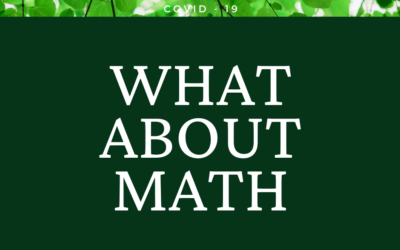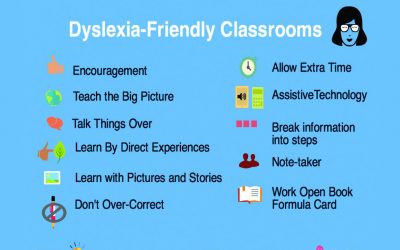With many states ordering schools to remain shut for the remainder of the school year AND the prospect fall quarter may also be waived, there are certainly going to be gaps in math education. Parents and teachers must try to make as intelligent decisions as they can...
“LIKE” Terms in Algebra Don’t Let Words Get in the Way
Many students get confused about "like" terms in Math, but it's not their fault. The terminology is confusing. Purple Math has a nice page on this post. In Algebra, "like terms" refers to terms that have the exact same variable raised to the same power. WATCH YOUTUBE...
Learning Doubles to Boost Math Facts Fluency
Learning doubles math facts can help with number flexibility. After learning how to count and "count on", doubles may be the next skill to learn. Origo Education has a nice post about how to introduce and practice doubling facts with students. First, students look for...
Dyslexia and Math: Understanding Decimals [Premium]
WHY DECIMALS ARE HARD There are many confusing aspects to decimals that are helpful to recognize when helping students. Contrary to working with whole numbers, longer sequences of numbers are not larger than shorter ones. For instance, with whole numbers, 245 is greater than 2, but .0245 is smaller than 2. For math processes involving decimals, multiplying by a decimal number between 0 and 1 is also opposite to what one might be used to. After learning that multiplication is equal groups or repeated addition, multiplying 0.3 x 0.4 = 0.12, a number that is smaller than 0.3 or 0.4. Similarly, dividing by a decimal can result in a number that is bigger than what we started out with, which can seem even more confusing. […]
PUTTING A NAME ON IT: Dyslexia, Dysgraphia, and Dyscalculia
The school year begins and then there's a lull. The first days of excitement and change are past and now teachers are trying to figure out their students and students are trying to figure out their teachers. Now is a good time for students to talk to their teachers...
MATH: The Problem of Showing Work [Premium]
If you live in a Common Core state and your student attends public school chances are they frequently are asked to “show their work”. There can be significant challenges for dyslexic students showing work because to do so requires a great deal of verbal working memory, word retrieval, executive function, and writing, all tasks that can overload each other. As with many curricula, the intentions and logic behind some of the choices seem reasonable; but also like many programs, the implementation has significant flaws so that students can become trapped in the process. Students must conform to a curriculum or fail rather than a curriculum being designed to meet the needs of students. For instance, math teachers Katherine Beals and Garry Garelick reviewed some of […]
Don’t Let Working Memory Prevent Math Learning
We don't spend enough time thinking about how much working memory overload could be impact in learning. In math, the issue is especially dire. CALCULATIONS In the early grades, working memory overload can occur when basic math facts can't be learned to the point of...
Teaching Math – No Need for Speed
"What do teachers need to know about teaching math? Strategy over speed, and math thinking over rote memorization." - Stanford Professor Dr Jo Boaler Check out Jo's tips from her new article, Speed and Time Pressure Block Working Memory (below). "I was always deeply...
Test Accommodations for Students with Dyslexia Under the ADA – DOJ Statement
The Department of Justice has also released video clarification of key rights for students regarding testing accommodations under the ADA or Americans with Disabilities Act. The entire video is located at the bottom of this post, but we are highlighting a section...
The Visual Life of Photographer CLARK JAMES MISHLER
"I believe that not being able to read has offered me some fabulous opportunities to see the world differently. " Clark Mishler Clark Mishler is one of the most sought-after photographers in Alaska and one of the top assignment photographers in the country. Thanks to...
Q: What Are the Best Tests for Dyscalculia? What About the Feifer Test?
Dyscalculia, or a math learning disability is important to identify because formal identification can qualify a student for accommodations both in the classroom and for high stakes tests. It can co-occur with dyslexia and it is under-recognized. We previously reviewed...
Your Brain on Math Anxiety [Premium]
This is your brain with math anxiety. In children as young as 7 years old, researchers found that activation in areas such as the amygdala and hippocampus were seen in children who had high math anxiety. The amydala and hippocampus are areas of the brain associated with fear condition and negative emotions. The children were given simple and complex arithmetic problems and asked to determine whether the answers given were right or wrong. The children in the high and low anxiety group were matched for IQ, working memory, reading and math performance, and general trait anxiety. As a double burden, the high math anxiety group (HMA) in the figure showed lower brain fMRI activation in areas associated with math processing. So anxiety could be acting […]




![Dyslexia and Math: Understanding Decimals [Premium]](https://www.dyslexicadvantage.org/wp-content/uploads/2020/02/decimals-fractions-shutterstock-400x250.jpg)

![MATH: The Problem of Showing Work [Premium]](https://www.dyslexicadvantage.org/wp-content/uploads/2020/01/April-Newsletter-MATH-the-problem-of-showing-work-400x250.jpg)





![Your Brain on Math Anxiety [Premium]](https://www.dyslexicadvantage.org/wp-content/uploads/2016/02/shutterstock_331750409.jpg)













